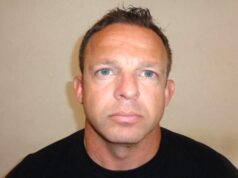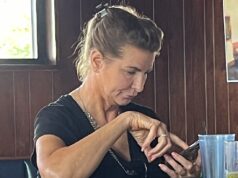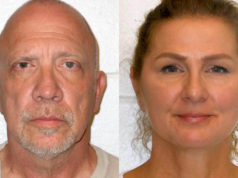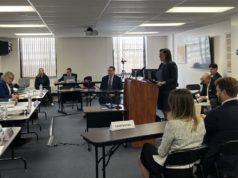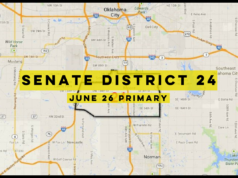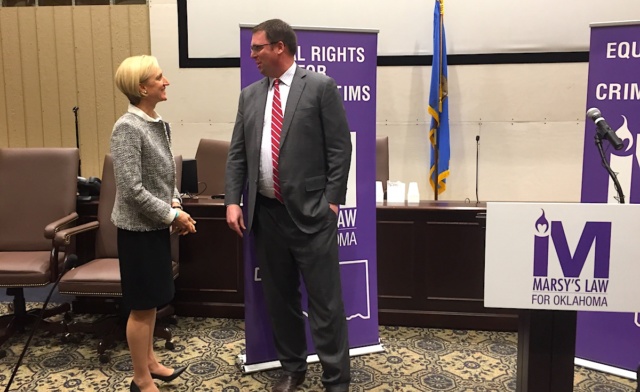
From age 11 until age 16, Virginia Lewis was sexually abused by her father, a high-profile Tulsa attorney. Thanks to his legal connections and a system that Lewis believes inadequately supports victims, the man who traumatized her received a deferred prosecution, kept his job and retained his license to practice law.
“In the deferred prosecution agreement, it states that I was reluctant to testify against him, and that is a total lie. That is a complete falsehood,” Lewis said. “I was never asked about any of it. I didn’t know he got a deferred prosecution agreement until years after it was already done. I was never asked by any attorney what I wanted, any law enforcement agent, a therapist. No one asked me what I wanted.”
Lewis appeared at a press conference today at the Oklahoma State Capitol in support of Marsy’s Law, a victim’s bill of rights that could be codified in the Oklahoma Constitution by a vote of the people if placed on the ballot by the Legislature.
“The message is, ‘What you went through matters,'” Lewis said in a video played for media. “Right now in Oklahoma, the scale is heavily weighted in favor of perpetrators.”
HJR 1002, which has been assigned to the House Rules Committee, would take crime victims’ rights that are already enumerated in state statute and place them into the Oklahoma Constitution, said Rep. Scott Biggs (R-Chickasha) who has authored the resolution.
“It’s a similar process to Miranda rights,” Biggs said, noting that law enforcement officers would carry a card and be required to tell a victim his or her rights. “Marsy’s Law is a growing movement across this country, and we believe our HJR language will ensure a healthy debate this session.
“You have some individuals here in Oklahoma and some judges who feel that a victim’s rights are trumped by the accused’s rights. We have victims who feel like they’re not informed about their case.”
Lewis was one of those victims, unaware as a high schooler what rights she had to seek justice against an abusive father. She said she has battled depression throughout her life and anorexia in her 20s, nearly dying in a hospital bed from the eating disorder. She was 5’8″ and weighed less than 100 pounds.
“I didn’t know what I didn’t know. You could be victimized when you walk out of here, and you won’t know what to do,” Lewis said. “You are navigating in the dark, and to just know, ‘Here are your rights,’ it’s grounding, it’s empowering. And the message this law sends is, as a victim, you do matter.”
Lewis, 46, first told her story publicly last year while promoting a legislative effort to extend the statute of limitations under which child victims of sexual assault could come forward. Current law offers a 12-year window, but last year’s proposal to increase it to 18 years failed.
Now, Lewis said she is proud to be promoting Marsy’s Law as a way to improve the legal system for victims.
“If you think about it, more consideration is given right now to people who don’t pay their electric bill than to victims of sexual assault,” she said. “Most states, you get a shutoff notice if you’re going to have your electricity discontinued, but you don’t get that same respect afforded to you if your perpetrator is going to be let out of prison.”
‘This sort of thing comes up all the time’
Marsy’s Law has passed in five other states, Biggs told reporters during Tuesday’s press conference, and Oklahoma could become the sixth.
He and Oklahoma District Attorneys Council chairman Mike Fields said victims’ rights are sometimes viewed as less important than defendants’ rights because the former are only in statute and the latter are in the U.S. Constitution.
“I’ve been a prosecutor for 20 years, and this sort of thing comes up all the time,” said Fields, the DA for District 4, which includes Canadian, Garfield, Blaine, Grant and Kingfisher counties. “Marsy’s Law represents the next important step forward. It elevates (a victim’s) right to a trial without unreasonable delay up to an equal level to a defendant’s right to a speedy trial.”
Fields said Marsy’s Law, if passed, would force judges to balance a victim’s rights with those of the accused.
“From my experience, one of the things that the system hears most consistently as a criticism from crime victims (is) from their perspective, they see a system that bends over backwards protecting the rights of a criminal, as it should,” Fields said. “However, lost in there is their voice. ‘What about me?'”
Fields noted that victims would see a change in “pre-filing” practices in that they would be alerted to their rights more immediately.
“Currently, those rights don’t kick in until a charge is filed,” he said.
But asked whether Marsy’s Law would provide an opportunity for cause of action against a district attorney who declines to prosecute, Fields and Biggs each expressed uncertainty as to whether a victim would have the right to press a DA in court without charges filed against a defendant.
“I’m not sure,” Fields said. “I’d have to put some thought into the implications of that. But it’s a good question.”
Biggs, a former prosecutor himself, offered the same reaction.
“When the victim’s rights cause of action kicks in? That’s a good question, and I don’t know the answer,” Biggs said. “That is one we haven’t discussed and haven’t talked about.”
‘Speak your truth’
At Tuesday’s press conference, Lewis sat to the right of the podium, humbly representing the more than 16,000 Oklahomans who are victims of violent crime each year. She spoke publicly only in a brief video.
Afterward, she told NonDoc that despite the progress she has made in her recovery, days like today remain difficult.
“My world has been pretty small. You keep it as safe as you can once you’ve been traumatized and victimized like that,” Lewis said, pivoting back to the potential benefit of Marsy’s Law. “Once you’ve been victimized, one of the things that happens is you no longer want surprises in your life. To be frontloaded with as much information is very healing. From the justice side of things, it’s just a sign of respect.”
Lewis, a teacher, operates www.ToPrevail.org in an attempt to help and advocate for victims of sexual assault.
“I would encourage them to get the counseling they need, to stand up for their rights, to believe in themselves and their truth because that is empowering,” she said. “That is healing when you speak your truth. Since I went public last year, I am a completely different person. The shift in responsibility that occurred when I finally spoke my truth was enormous. I’m not burdened by that guilt and that shame as much as I used to be.”
She said she runs support groups in Tulsa and will be starting a new group in Oklahoma City soon.
“I run support groups, and I think that’s enormously helpful because, even though counseling is really imperative because of how complicated abuse is and sexual assault is — and especially when you’re young and all the re-wiring that needs to be done — but there are some things that only other survivors can understand.
“That’s what has been so healing and empowering in running support groups. There is an intimacy that transcends most other relationships that you have because you have experienced something that has left you raw, vulnerable and wounded.”
The text of HJR 1002 can be viewed here:










